The Orucase B2 Bike Travel Case reviewed: the most compact, rolling bike case on the market
This compact bike case best serves those with multimodal trips or limited rental car space
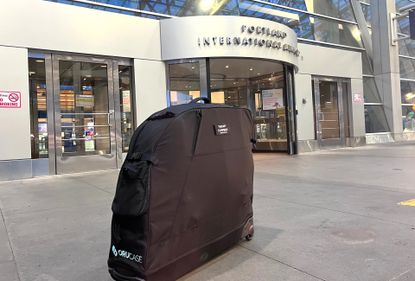
The Orucase B2 Bike Case is a sleek, highly portable and trustworthy bag that, while not the easiest to pack, is still the best option for those limited on space and/or traveling on multiple modes of transportation.
-
+
Highly portable
-
+
Great for multimodal trips
-
+
At 15lbs, it's one of the lightest bags on the market
-
+
Compact in size and storable
-
+
The backpack strap is pretty unique
-
+
Cute "Therapy Equipment" tag
-
-
You have to be comfortable taking your bike apart to pack your bike
-
-
You have to take off your fork
-
-
It's time-consuming to pack and reassemble your bike
-
-
A little lopsided when packed, making it prone to tipping
-
-
These days, airlines charge per weight more than size
-
-
You're going to want to purchase the frame protection kit also
-
-
On the spendier end of bike travel cases
You can trust Cycling Weekly.

Travel has been a big part and perk of my job for the past eight years. While it may look like us cycling journalists are just playing bikes all over the world, the saddle time is actually quite limited. For trips not surrounding a product launch, I like to bring a bike to get some miles in whenever possible. If I know my riding will be limited to mobility only, I opt for my Brompton. If I have a chance to go on an actual spandex-glad ride, I prefer to bring a full-sized bike. But carrying around a large, unyielding bike bag isn't optimal either.
Since 2017, I've made bike travel easier on myself with the purchase of the OG Airport Ninja bag from Orucase — a stealthy black bag, complete with backpack straps, that meets most airlines' size requirements as a standard piece of luggage — 62 linear inches. I've hauled that bag on dozens of trips and its compactness isn't just great for skirting luggage fees; it's an asset when it comes to regular-sized Ubers, trains, buses and rental cars.
In the past few years, however, airlines have gotten smart about recognizing bikes and nowadays, the desk agent simply asks me to "put the bike on the scale" rather than "What's in the bag?" – making it harder to dodge sports equipment fees.
Still, the space-saving and portability of the small bag comes in handy on many occasions, so the Ninja bag lives on. Orucase has since made some improvements to its bag, which I longed for. These improvements most notably include relocated and padded shoulder straps as well as an ever so slightly altered, roomier shape. Better still, Orucase introduced a rollable, more robust version of the Ninja bag in 2019. The latest version of this is the B2-R Bike Travel Case reviewed here. I've taken the B2 on a number of flights this season, both domestic and international -- here's how my bike fared.
Orucase B2 Bike Travel Case: construction
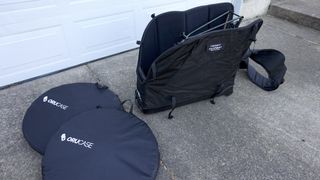
The B2 comes with two lightly padded wheel bags
The B2 was built upon the platform of the original Airport Ninja with the goal to improve the bag's usability, protection and portability. Additionally, with its two versions, the B2 can accommodate bigger bikes. The B2-R (road version) is made to fit all road and gravel bikes up to 58cm. The B2-MTB (mountain bike version) will fit hardtail and full-suspension bikes up to a size XXL with 160mm travel and 29-inch wheels.
The all-black bag still looks as sleek as can be, but its more rounded shape does give away its contents. I can no longer pretend it's a massage table or convention equipment.
While the OG Airport Ninja was little more than a bike-carrying backpack, the B2 is built around a rugged, compression-molded base with two aluminum base rails for extra protection. There are two oversized wheels at the end of the base and a handle (one of several) on the opposite end of the base. The rest of the bag is a reinforced soft case made of sturdy ballistic nylon.
Padded backpack straps are tucked away horizontally in the middle of the bag – neatly hidden until called to action. There are three additional handles on the top and sides of the bag for carrying options. There's also a small, zippered outside pocket. Internally, stiff compression-molded foam panels zip into the inside of the bag for reinforcement. Additionally, the bag comes with two padded wheel bags. Inside, there are several cleverly situated, padded storage pockets as well as dividers.
The whole package weighs in at around 15 pounds, making it one of the lightest bags on the market and leaving you with 35 pounds for your bike and other luggage before hitting that 50-pound mark when the overweight fees kick in.
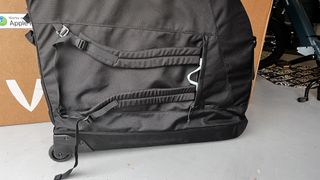
Stowable padded backpack straps for extra portability
Assembling and packing the bag
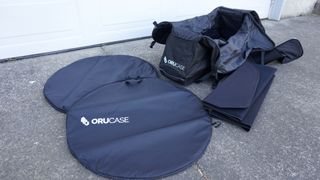
The Orucase B2 Bike Travel Case before assembly
The B2, in its folded state, takes up very little space. It easily fits underneath your bed or in the corner of a closet. This is great, but it does mean there's some assembly required to ensure the bag's rigidity and protection. Not to mention packing the bike itself. It's downright tricky, so please watch or read Orucase's instructions before starting the endeavor. Unlike your car manual, which one tends to read only when something goes awry, you'll want to heed the bag's instructions to avoid things from going wrong.
Even after my years of Airport Ninja packing experience, assembling and packing the B2 on my first outing took some time, so I'd highly suggest you pack everything up the night before your flight. By now, I have the whole assembling and packing process down to about half an hour, but I still don't like starting the process too close to my departure.
The bag is assembled by unhooking the retention straps, followed by opening and unfolding the bag to remove the protective panels and wheel bags. Once unfolded, the protective panels zip into the sides of the bag, which is a little finicky but good lighting helps.
Once the bag is assembled, you're going to have to disassemble your bike. That is to say, the bars and stem, the fork, the wheels and the pedals all need to come off. To minimize damage, I also remove the chain, derailleur(s) and, sometimes, the seatpost with saddle.
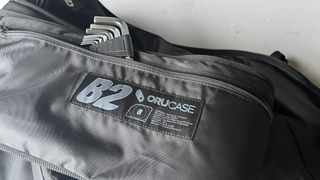
The B2 features several clever compartments for tools, pedals and accessories
The B2 features a padded spot for the disc brake rotors, which is a thoughtful addition. Once in their padded sleeves, the wheels go on the edges of the compartment, and the frame gets tucked in between. I usually secure my fork and bars to the downtube of the frame and slide the whole package in as one. There are storage spaces inside the bag for your pedals, tools and other parts.
It's a snug fit but if done well, there's still some room for clothing, shoes and a helmet. The bag makes use of some super sturdy YKK zippers, which is essential as they're constantly being tested by the sheer bulk of the bag's contest. I fear for the day that some TSA agent is unsuccessful in closing the bag, but it hasn't happened yet!
Traveling with the B2
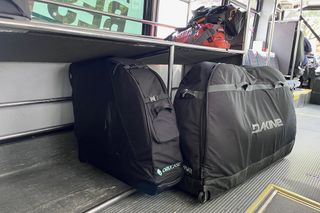
Nearly half the size of the Dakine, the B2 fits easily on public transportation
For me, the rolling feature of the B2 case is a huge improvement from the Orucase Ninja backpack. The two oversized rubber wheels take on the load with ease and roll along nicely. There are two handle options to lift and pull from, but I really only use the upper of the two. The bottom handle, attached to the rigid base, would tip the bag too high and too far back, where you'd risk scraping the bag on the ground.
To the Uber, onto a bus, through revolving doors and across a long parking lot – the bag rolls along merely but, perhaps due to its short wheelbase, it's not quite as stable as, say, my full-size Dakine roller case. No matter how I pack the B2, it always ends up being slightly lopsided when loaded, making it prone to tipping on its side when moving a little fast or cornering.
But it's only a small trade-off for the convenience of having a bag that's almost half the size than a regular bike case, therefore fitting easily on public transport and in the trunk of most cars.
How did my bike look on the other end?
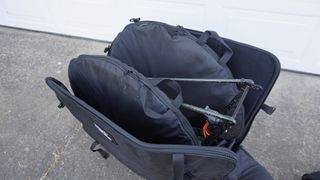
It's a snug fit but if done well, there's still some room for clothing, shoes and a helmet.
On two of the three trips I've completed with this bag, the case did its job superbly and my bike came away unscathed.
On my international trip, however, where the case was manhandled by baggage handlers at least three different times on each leg of the trip, the bike did sustain some paint scratches and carried evidence of the bag having been bumped on its sides and top, the latter of which is not reinforced.
As with any case really, the risk of damage largely comes down to frame protection and securing any loose items in the bag. While foam protection usually does the job, items can get shifted in the TSA inspection or through the travel process. Orucase actually sells a robust Frame Protection Kit ($129), which, after my last experience, I will most certainly be purchasing - even for trips where I may use another bag.
But cosmetic damage aside, my bike always arrived fully functional and, once reassembled, ready to ride.
Value and Conclusion
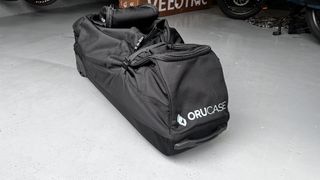
When not in use, the B2 can fit underneath your bedframe or in the corner of a closet.
The B2 bike case sports a lot of welcomed features the Airport Ninja doesn't have. It's got backpack straps and a rollable chassis. A compact, space-saving size with reinforced protection. The Orucase B2 Bike Case is a sleek, highly portable and trustworthy bag that while not the easiest to pack, is still the best option for those limited on space and/or traveling on multiple modes of transportation. .
At $649, the bag is on the higher end of bike case offerings, yes. But in my opinion, it's an investment worth considering. Any good bike case will help transport your bike to wherever you need to go safely and securely but few cases do so with such ease of portability, let alone help you dodge oversize baggage fees and save you money in Uber and rental car fees.
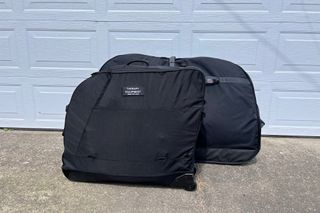
The B2 versus a full-sized bag
Specs
- 1680 Denier Ballistic Nylon Exterior
- Compression-molded base
- Aluminum rails on the bottom
- Two oversized wheels
- Oversized #10 YKK Zipper
- Stiff compression-molded foam armor panels zip into the inside of the bag
- Storage pockets and dividers inside and outside the bag
- Padded wheel bags
- External zippered pocket
- Stowable, padded backpack straps
- Packs down to 1/3 its full size in seconds for convenient storage
- Dimension when packed (measured): B2-R: 29 x 34 x 9"
- Weight: 15 lbs

Thank you for reading 20 articles this month* Join now for unlimited access
Enjoy your first month for just £1 / $1 / €1
*Read 5 free articles per month without a subscription

Join now for unlimited access
Try first month for just £1 / $1 / €1
Get The Leadout Newsletter
The latest race content, interviews, features, reviews and expert buying guides, direct to your inbox!

Cycling Weekly's North American Editor, Anne-Marije Rook is old school. She holds a degree in journalism and started out as a newspaper reporter — in print! She can even be seen bringing a pen and notepad to the press conference.
Originally from The Netherlands, she grew up a bike commuter and didn't find bike racing until her early twenties when living in Seattle, Washington. Strengthened by the many miles spent darting around Seattle's hilly streets on a steel single speed, Rook's progression in the sport was a quick one. As she competed at the elite level, her journalism career followed, and soon she became a full-time cycling journalist. She's now been a cycling journalist for 11 years.
-
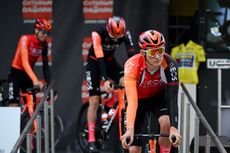 'With a few changes, it'll be class' - Josh Tarling optimistic about Ineos Grenadiers future
'With a few changes, it'll be class' - Josh Tarling optimistic about Ineos Grenadiers future'Everybody wants to get better and get back to winning,' 20-year-old tells audience at Rouleur Live
By Tom Davidson Published
-
 'There are simple remedies in order to be inclusive': Paralympian says cycling still has work to do in order to improve on diversity and inclusion
'There are simple remedies in order to be inclusive': Paralympian says cycling still has work to do in order to improve on diversity and inclusionBlaine Hunt says inclusion issues for Paralympians far greater than athletes being asked to wear tracksuits on a recent visit to Buckingham Palace to meet King Charles
By Tom Thewlis Published
-
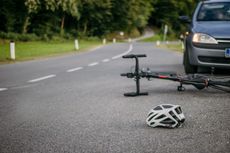 ‘I want to get back on the bike but I’m terrified’: After being hit by three drivers, one cyclist has had enough
‘I want to get back on the bike but I’m terrified’: After being hit by three drivers, one cyclist has had enoughA third crash left one rider with a broken back and a long time off the bike
By Adam Becket Published